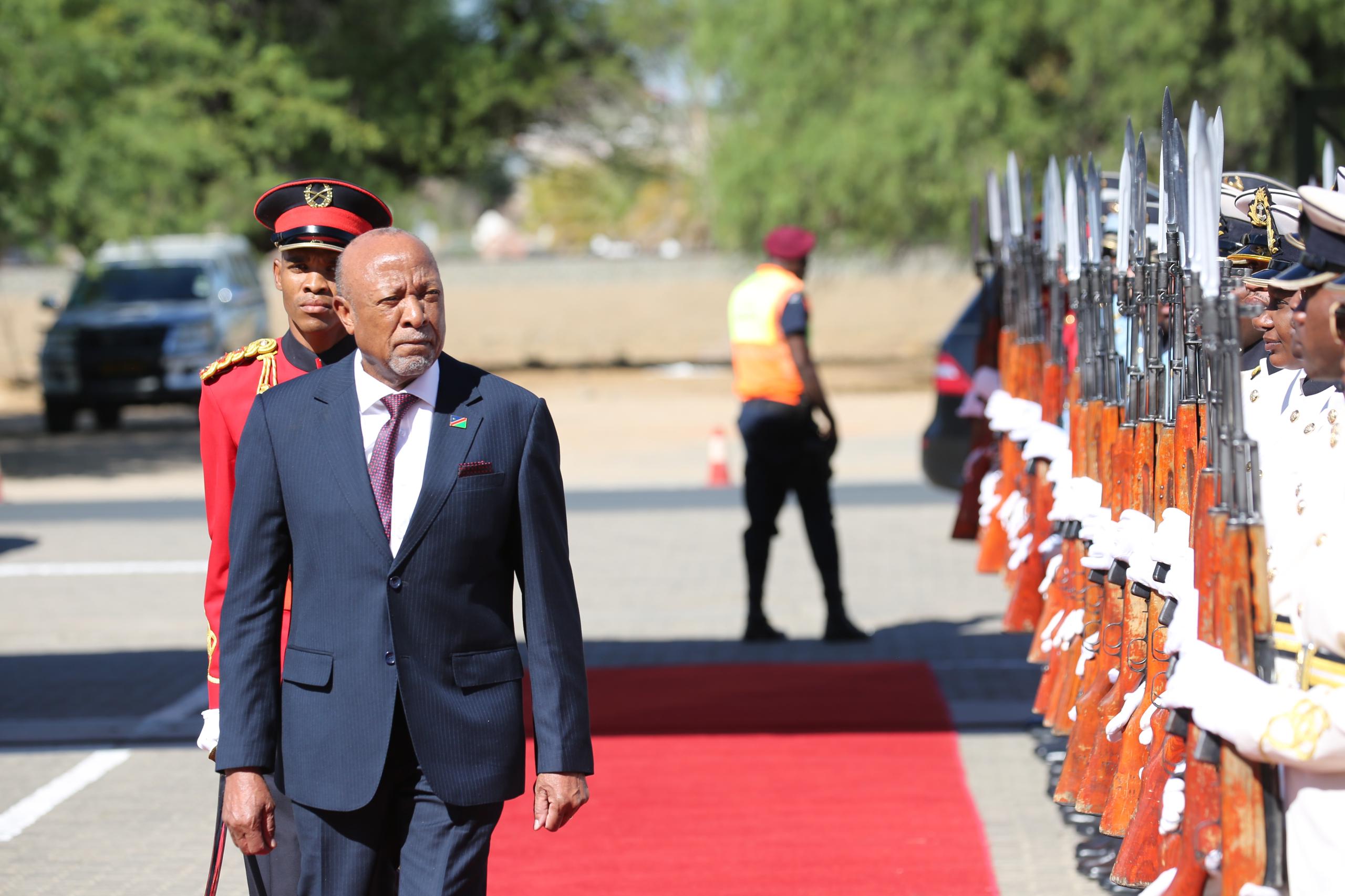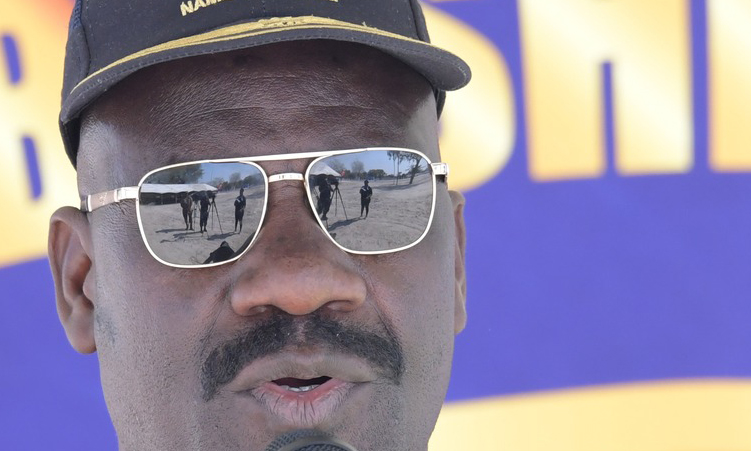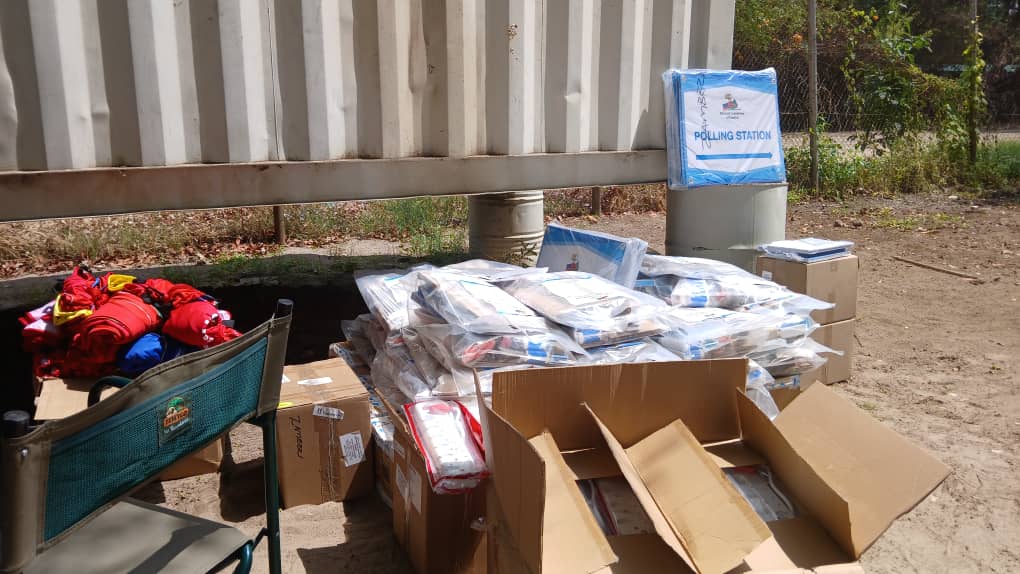CENTRAL Government leaders have assumed responsibility for setting up the capital’s own police force, creating ripples of concern among municipal officials wary of political interference.
A new committee dominated by Government security agents has replaced one comprised largely of municipal officials, according to Windhoek City Council sources. The Namibian has learnt that the committee’s creation follows pressure from State House and two Cabinet ministers – the Minister of Home Affairs, Jerry Ekandjo, and the Minister of Regional and Local Government and Housing, Joel Kaapanda.Amendments to the Local Authorities Act would be made so that top posts in city police were not advertised, confirmed Home Affairs Minister Jerry Ekandjo, who denied interference.Political meddling, particularly from State House, is said to have contributed to an early exit by former Windhoek Chief Executive Officer Martin Shipanga.But Mayor Matheus Shikongo has denied that Shipanga left because of political pressure.He said a career opportunity had presented itself to Shipanga, who is now in charge of the Commercial Bank of Namibia.Shipanga could not be reached for comment yesterday.Ekandjo said he had become involved because the Police Act required him to approve the establishment of any municipal police force.He added that he had become concerned that setting up a city police force was taking too long while civic and Government employees bickered.Despite the central Government’s heavy role, Windhoek ratepayers still have to pay for the establishment and upkeep of Namibia’s first municipal police force.Home Affairs Minister Ekandjo said he had learnt only recently that conflict between Government officials on the former implementation committee was holding up the process.He then ordered that Windhoek municipal councillors be removed from the committee so that only Government and City Council employees would sit on a new ‘technical committee’.The committee will help Ekandjo draft regulations governing the city police.”There has been pulling [conflict] and it was moving slowly.I just said our politicians should not be involved in technical matters.When you bring politicians in, they will come with politics,” he said.But sources say the new committee – which comprises two representatives each from NamPol, the Namibian Central Intelligence Service, the Namibian Defence Force and the municipality, plus other Government appointees – will have a wide-ranging role in determining the operations and composition of the city police.Mayor Shikongo has confirmed the make-up of the committee.A council official said: “The bone of contention is that some senior NamPol guys are vying for top positions in the city police”.Another source commented: “NamPol does not want to be outperformed, which is likely to happen if the city police is run entirely by the municipality.If implemented the way they [Government] want it, the city police will function as a mere extension of NamPol: effectiveness and professionalism will be compromised”.Ekandjo said the requirement in the Local Authorities Act that all posts be advertised would not apply to the proposed Windhoek city police.The remodelled committee will recommend senior appointments in the force to the City Council and Government leaders.He dismissed suggestions that the Windhoek police might be politicised, asking rhetorically: “Why are the [NamPol] Police not politicised?” City police officers, like their counterparts in the NamPol and the military, will not be allowed to join trade unions.Like Ekandjo, Mayor Shikongo yesterday denied that political pressure had been exerted.”You must also understand that there is security at stake [and the city police] will still fall under normal security laws of the country,” said Shikongo.The Mayor also denied there had been State House interference, saying only that “consultations now and then” had taken place.”I don’t see [that] as an interference from State House,” he said.The Municipality embarked on setting up a police service about three years ago, but some of its officials said the Home Affairs Ministry and NamPol bureaucracy had put a spoke in the wheel of the city’s plan to set up its own law enforcement agency.About 9 000 applications had been received for 150 advertised posts.Shikongo said recruitment would not now start afresh.Meanwhile, the City Council is believed to have raised nearly N$30 million from ratepayers, earmarked for the police, denoted as a “special service”.Ekandjo said he had asked that the city police force be up and running by the end of May.Regional and Local Government Minister Joel Kaapanda could not be reached for comment.The Namibian has learnt that the committee’s creation follows pressure from State House and two Cabinet ministers – the Minister of Home Affairs, Jerry Ekandjo, and the Minister of Regional and Local Government and Housing, Joel Kaapanda. Amendments to the Local Authorities Act would be made so that top posts in city police were not advertised, confirmed Home Affairs Minister Jerry Ekandjo, who denied interference. Political meddling, particularly from State House, is said to have contributed to an early exit by former Windhoek Chief Executive Officer Martin Shipanga. But Mayor Matheus Shikongo has denied that Shipanga left because of political pressure. He said a career opportunity had presented itself to Shipanga, who is now in charge of the Commercial Bank of Namibia. Shipanga could not be reached for comment yesterday. Ekandjo said he had become involved because the Police Act required him to approve the establishment of any municipal police force. He added that he had become concerned that setting up a city police force was taking too long while civic and Government employees bickered. Despite the central Government’s heavy role, Windhoek ratepayers still have to pay for the establishment and upkeep of Namibia’s first municipal police force. Home Affairs Minister Ekandjo said he had learnt only recently that conflict between Government officials on the former implementation committee was holding up the process. He then ordered that Windhoek municipal councillors be removed from the committee so that only Government and City Council employees would sit on a new ‘technical committee’. The committee will help Ekandjo draft regulations governing the city police. “There has been pulling [conflict] and it was moving slowly. I just said our politicians should not be involved in technical matters. When you bring politicians in, they will come with politics,” he said. But sources say the new committee – which comprises two representatives each from NamPol, the Namibian Central Intelligence Service, the Namibian Defence Force and the municipality, plus other Government appointees – will have a wide-ranging role in determining the operations and composition of the city police. Mayor Shikongo has confirmed the make-up of the committee. A council official said: “The bone of contention is that some senior NamPol guys are vying for top positions in the city police”. Another source commented: “NamPol does not want to be outperformed, which is likely to happen if the city police is run entirely by the municipality. If implemented the way they [Government] want it, the city police will function as a mere extension of NamPol: effectiveness and professionalism will be compromised”. Ekandjo said the requirement in the Local Authorities Act that all posts be advertised would not apply to the proposed Windhoek city police. The remodelled committee will recommend senior appointments in the force to the City Council and Government leaders. He dismissed suggestions that the Windhoek police might be politicised, asking rhetorically: “Why are the [NamPol] Police not politicised?” City police officers, like their counterparts in the NamPol and the military, will not be allowed to join trade unions. Like Ekandjo, Mayor Shikongo yesterday denied that political pressure had been exerted. “You must also understand that there is security at stake [and the city police] will still fall under normal security laws of the country,” said Shikongo. The Mayor also denied there had been State House interference, saying only that “consultations now and then” had taken place. “I don’t see [that] as an interference from State House,” he said. The Municipality embarked on setting up a police service about three years ago, but some of its officials said the Home Affairs Ministry and NamPol bureaucracy had put a spoke in the wheel of the city’s plan to set up its own law enforcement agency. About 9 000 applications had been received for 150 advertised posts. Shikongo said recruitment would not now start afresh. Meanwhile, the City Council is believed to have raised nearly N$30 million from ratepayers, earmarked for the police, denoted as a “special service”. Ekandjo said he had asked that the city police force be up and running by the end of May. Regional and Local Government Minister Joel Kaapanda could not be reached for comment.
Stay informed with The Namibian – your source for credible journalism. Get in-depth reporting and opinions for
only N$85 a month. Invest in journalism, invest in democracy –
Subscribe Now!






